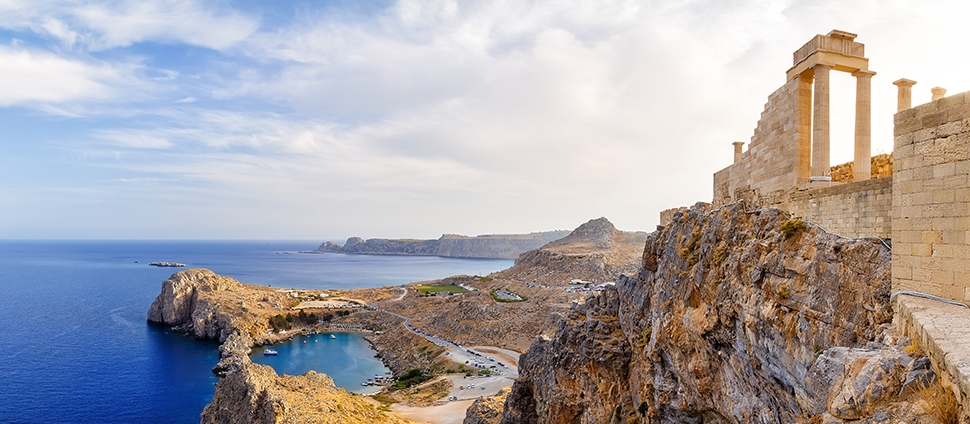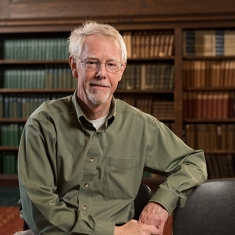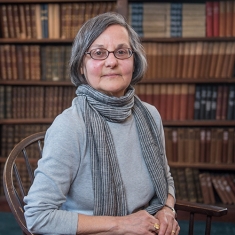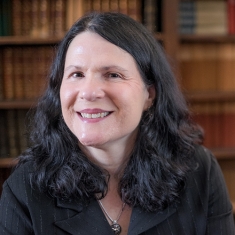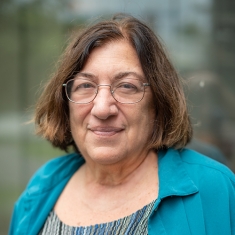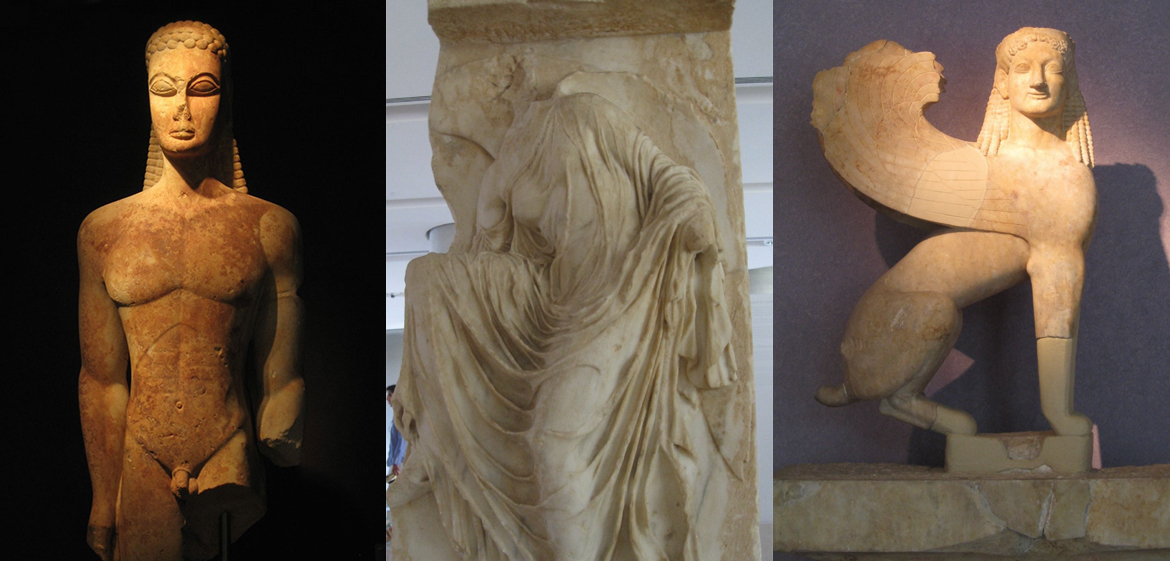Classics is the study of ancient Greek and Roman civilization, which laid the foundation of the western tradition in literature, philosophy, history, art, science and mathematics. Classics is thus not confined to one field or method, but has always been inherently interdisciplinary. Classics students spend most of their time reading Greek and Latin texts in the original languages, but they can also take courses in English translation in a variety of disciplines in order to get a broader, interdisciplinary perspective. Classics makes a dynamic and rewarding standalone major, but it can be (and often is) paired with a second major.
Announcements
Welcome students!
The Department of Classical Languages and Literatures sends a warm welcome to Smith students, both returning and new. Best wishes for a great spring semester!
The Department of Classical Languages and Literatures regards its principal mission as instruction of students in the languages and literatures of Ancient Greece and Rome. We believe that the study of Greek and Latin provides students with a rigorous intellectual training that is transferable to other areas of learning and life. We practice the deep study of language on texts—literary, historical and philosophical—that we admire for the directness and vigor with which they confront central issues of the human condition: love and death, freedom and tyranny, justice and injustice. A sustained confrontation with classical texts not only heightens a student’s sensitivity to literature and involves her in a valuable cultural odyssey, but also prepares her for a life of thoughtful and engaged citizenship in the world of the 21st century.
Students majoring in classics or classical studies should be able to:
-
Translate with accuracy and understanding Latin and/or Greek texts from a variety of historical periods and genres.
-
Appreciate literary texts (epic, tragedy, elegy, oratory, history or philosophy) in relation to their historical frameworks, both diachronic (texts in dialogue with one another across a literary tradition) and synchronic (texts responding to specific historical conditions).
-
Have a working knowledge of the basic tools and resources, both print and electronic, for conducting research about ancient Greek and Roman culture.
-
Write clear, cogent interpretive arguments that demonstrate an ability to evaluate and engage critically with both primary sources and secondary literature.
-
Communicate ideas clearly and effectively in oral argument.
- Develop an historical awareness of the enduring influence of the classics in the arts and culture of subsequent periods up to the present day.
The Department of Classical Languages and Literatures currently offers four majors: classics, classical studies, Greek and Latin.
Classics
Advisers: Members of the department
Basis: Greek 100y and Latin 100y
Requirements: Nine semester courses in the languages of which six must be at or above the intermediate level and including not fewer than two in each language. One classics-in-translation course may be substituted for one language course at the discretion of the student and with the approval of the adviser.
Classical Studies
Advisers: Members of the department
Basis: Greek 100y and Latin 100y
Requirements: Nine semester courses. Four must be chosen from GRK and/or LAT, and at least two of these must be at or above the intermediate level. At least two courses must be chosen from classics-in-translation (CLS), and at least two must be chosen from archeology (ARC), art history (ARH), comparative literature (CLT), government (GOV), ancient history (HST), philosophy (PHI) and/or religion (REL), in accordance with the interests of the student and in consultation with the adviser. With the approval of the adviser, courses in other departments and programs may count toward the major.
Greek
Advisers: Members of the department
Basis: Greek 100y
Requirements: Nine semester courses in the language, of which six must be at or above the intermediate level. One classics-in-translation course may be substituted for one language course at the discretion of the student and with the approval of the adviser.
Latin
Advisers: Members of the department
Basis: Latin 100y
Requirements: Nine semester courses in the language, of which six must be at or above the intermediate level. One classics-in-translation course may be substituted for one language course at the discretion of the student and with the approval of the adviser.
Classics
Requirements: Six four-credit courses, of which at least four must be courses in the Greek or Latin languages, including no fewer than two in each language. At least two of these six must be at or above the intermediate level.
Greek
Requirements: Six four-credit courses, of which at least four must be courses in the Greek language and at least two must be at or above the intermediate level. The remaining courses may be chosen from Greek history, art, ancient philosophy, ancient political theory, ancient religion or classics in translation. At least one course must be chosen from this category.
Latin
Requirements: Six four-credit courses, of which at least four must be courses in the Latin language and at least two must be at or above the intermediate level. The remaining courses may be chosen from Roman history, art, ancient philosophy, ancient political theory, ancient religion or classics in translation. At least one course must be chosen from this category.
Honors Director: Nancy Shumate
Requirements: A 3.7 average for courses within the major through the junior year. Honors candidates will complete a yearlong, 8-credit thesis and will take an examination in the general area of the thesis.
Evaluation: In determining the final honors evaluation the department weights the thesis at 60%, grades at 30%, and the examination at 10%.
Fall 2021
GRK 100Y Elementary Greek
A yearlong introduction to ancient Greek through the language of Homer's Iliad and Odyssey, the two 8th-century epics that represent the culmination of a long and rich tradition of oral poetry. The ancients regarded these poems as unparalleled masterpieces; the great tragedian Aeschylus called his own plays "crumbs from Homer's table," and both epics have endured over the millennia and are still alive and relevant. Identity, love, seduction, loyalty, the tension between individualism and community, between home and adventure -- these are some of the very human issues the Odyssey explores. Students will learn all the fundamentals of Greek vocabulary and grammar, and experience the joy of reading Homer's Odyssey in the original. Credits: 5
Barry Spence
GRK 214 Greek Poetry of the Archaic Age
An exploration of the poetic masterpieces of the Archaic period. We will study some of the songs bards performed to the accompaniment of the lyre, stories of war, exile and homecoming, monsters and divinities, love and lust. Readings will be chosen from works such as Homer's Iliad and Odyssey, Hesiod's Theogony and Works and Days, the Homeric Hymns. {F} {L} Credits: 4
Hans Hansen
GRK 400 Special Studies
For majors and honors students who have had four advanced courses in Greek. Admission by permission of the department. Credits: 1-4
Members of the department
Spring 2022
GRK 100Y Elementary Greek
A yearlong introduction to ancient Greek through the language of Homer's Iliad and Odyssey, the two 8th-century epics that represent the culmination of a long and rich tradition of oral poetry. The ancients regarded these poems as unparalleled masterpieces; the great tragedian Aeschylus called his own plays "crumbs from Homer's table," and both epics have endured over the millennia and are still alive and relevant. Identity, love, seduction, loyalty, the tension between individualism and community, between home and adventure -- these are some of the very human issues the Odyssey explores. Students will learn all the fundamentals of Greek vocabulary and grammar, and experience the joy of reading Homer's Odyssey in the original. Credits: 5
Barry Spence
GRK 215 Greek Prose and Poetry of the Classical Age
An introduction to different genres of prose and poetry in the Classical period, with attention to linguistic differences over time and region. Readings will be chosen from works such as Herodotus' History of the Persian War, the poetry of Solon the wise Athenian lawmaker, the philosophical dialogues of Plato, the Athenian courtroom speeches of Lysias, the tragedies of Euripides. Prerequisite: three semesters of Greek or permission of the instructor. {F} {L} Credits: 4
Thalia A. Pandiri
GRK 400 Special Studies
For majors and honors students who have had four advanced courses in Greek. Admission by permission of the department. Credits: 1-4
Members of the department
Fall 2021
LAT 100Y Elementary Latin
Fundamentals of grammar, with selected readings from Latin authors in the second semester. This is a full-year course. Enrollment limited to 30. Yearlong courses cannot be divided at midyear with credit for the first semester. Credits: 5
Rebecca Worsham
LAT 212 Introduction to Latin Prose and Poetry
Practice and improvement of reading skills through the study of a selection of texts in prose and verse. Systematic review of fundamentals of grammar. Prerequisite: LAT 100y, or the equivalent. {F} {L} Credits: 4
Nancy Shumate
LAT 400 Special Studies
For majors and honors students who have had four advanced courses in Latin. Admission by permission of the department. Credits: 1-4
Members of the department
Spring 2022
LAT 100Y Elementary Latin
Fundamentals of grammar, with selected readings from Latin authors in the second semester. This is a full-year course. Enrollment limited to 30. Yearlong courses cannot be divided at midyear with credit for the first semester. Credits: 5
Nancy Shumate
LAT 214 Introduction to Latin Literature in the Augustan Age
An introduction to the "Golden Age" of Latin literature, which flourished under Rome's first emperor. Reading and discussion of authors exemplifying a range of genres and perspectives such as Virgil, Ovid, and Horace, with attention to the political and cultural context of their work and to the relationship between literary production and the Augustan regime and its program. Practice in research skills and in reading, evaluating, and producing critical essays. Prerequisite: LAT 212 or permission of the instructor. {F} {L} Credits: 4
Hans Hansen
LAT 330 Advanced Readings in Latin Literature I & II
Topics course.
Authors vary from year to year, but they are generally chosen from a list that includes epic and lyric poets, historians, orators, comedians and novelists, depending on the interests and needs of the students. May be repeated for credit, provided the topic is not the same. Prerequisite: two courses at the 200-level or permission of the instructor.
Topic: Ovid, Metamorphoses: A study of the Metamorphoses of Ovid, the bad boy of Augustan literature, with a focus on possible meanings of the idea of metamorphosis in Ovid's cultural and political milieu, and in later ones such as that of the North African writer Apuleius and his Metamorphoses.
LAT 400 Special Studies
For majors and honors students who have had four advanced courses in Latin. Admission by permission of the department. Credits: 1-4
Members of the department
Although our principal focus is on work in the original languages, we are committed to bringing the classics to as many students as possible through courses in translation, both in our department and in the Program in World Literatures. We think that the classics in translation should provide as wide an audience as possible with a foundation in the Western literary tradition and, more broadly speaking, in Western intellectual history. But there is much in the classical world that is decidedly non-Western, for the ancient Mediterranean teemed with an astonishing diversity of cultures. There is no pressing contemporary issue for which the ancient world does not offer an interesting case study in cultural alternatives, and we believe that a classics department should explore issues of contemporary concern through courses in translation.
CLS 150 Roots: Greek and Latin Elements in English
What does “hypocrisy” have to do with the ancient Greek theater? And what does “delirium” have to do with Roman agriculture? Sixty percent of all English words are derived from Greek and Latin roots, yet the history and effective use of these words is problematical for many speakers of English. This course combines hands-on study of Greek and Latin elements in English with lectures and selected primary readings that open a window onto ancient thinking about language, government, the emotions, law, medicine and education. The course is graded S/U only. One evening meeting per week. {L} Credits: 2
Members of the department
Normally offered in alternate years
CLS 190 The Trojan War
The Trojan War is the first conflict to be memorialized in Greco-Roman literature—“the war to start all wars.” For Homer and the poets who came after him it raised such questions as: What justifies going to war? What is the cost of combat and the price of glory? How does war affect men, women and children, winners and losers? We look at the “real” Troy of the archaeological record, then focus on imaginary Troy as represented by Homer, Aeschylus, Euripides, Virgil, Ovid and Seneca. WI {A} {L} Credits: 4
Members of the department
Normally offered in alternate years
CLS 217 Greek Art and Archaeology
Same as ARH 217. This course is a contextual examination of the art and architecture of Ancient Greece, from the end of the Bronze Age through the domination of Greece by Rome (ca. 1100-168 BCE) and handles an array of settlements, cemeteries, and ritual sites. It tracks the development of the Greek city-state and the increasing power of the Greeks in the Mediterranean, culminating in the major diaspora of Greek culture accompanying the campaigns of Alexander the Great and his followers. The course takes a broadly chronological approach, and the question of a unified Greek culture is stressed. Continuing archaeological work is considered. (E) {A} {H} Credits: 4
Rebecca Worsham
Normally offered in alternate years
CLS 218 Hellenistic Art and Archaeology
We will examine the art, architecture, and material culture of the Hellenistic period, spanning the years from 323 to 31 BCE and representing one of the most exciting and dynamic eras of Greek history. Beginning with the expansionist campaign of Alexander the Great and ending with the conquests of the future emperor Augustus, it is a time of fast-paced change, experimentation, and diversity. In addition to examining the archaeology of this period, we will explore ideas about the accessibility of archaeological material and how this may be facilitated through digital collections and virtual reconstructions. {A} {H} Credits: 4
Rebecca Worsham
Offered in spring 2022
CLS 227 Classical Mythology
The principal myths as they appear in Greek and Roman literature, seen against the background of ancient culture and religion. Focus on creation myths, the structure and function of the Olympian pantheon, the Troy cycle and artistic paradigms of the hero. Some attention to modern retellings and artistic representations of ancient myths. {A} {L} Credits: 4
Members of the department
Normally offered in alternate years
CLS 233 Gender and Sexuality in Greco-Roman Culture
The construction of gender, sexuality, and erotic experience is one of the major sites of difference between Greco-Roman culture and our own. What constituted a proper man and a proper woman in these ancient societies? Which sexual practices and objects of desire were socially sanctioned and which considered deviant? What ancient modes of thinking about these issues have persisted into the modern world? Attention to the status of women; the role of social class; the ways in which genre and convention shaped representation; the relationship between representation and reality. {H} {L} Credits: 4
Members of the department
Normally offered in alternate years
CLS 237 Artifacts of Daily Life in the Ancient Mediterranean
This course uses the artifacts of the Van Buren Antiquities Collection as a starting point for investigating the daily life of the Greek and Roman worlds. In particular, students will select and research an object or objects for which to develop an "object biography," through which the people who produced, used, and re-used these objects might be accessed. Additional attention is given to the place of objects in archaeological practice and narratives. (E) {H} {S} Credits: 4
Rebecca Worsham
Offered in spring 2022
CLS 260 Transformations of a Text: Shape-Shifting and the Role of Translation
Whose work are you reading when you encounter a text in translation? How is the author’s voice modulated through the translator’s? What constitutes a “faithful” or a “good” translation? How do the translator’s language and culture, the expectations of the target audience, and the marketplace determine what gets translated and how? We consider different translations of the same text, including rogue translations, adaptations and translations into other forms (opera, musicals, film). Students produce their own translations or adaptations. No prerequisites, but students who have not taken CLT 150 are urged to enroll in that (2-credit, S/U) course concurrently. Credits: 4
Thalia Pandiri
Offered in spring 2022
CLS 400 Special Studies
For majors/minors and advanced students who have had three classics or other courses on the ancient world and two intermediate courses in Greek or Latin. Admission by permission of the department. Credits: 1-4
Members of the department
Normally offered both fall and spring semesters
Faculty
Resources
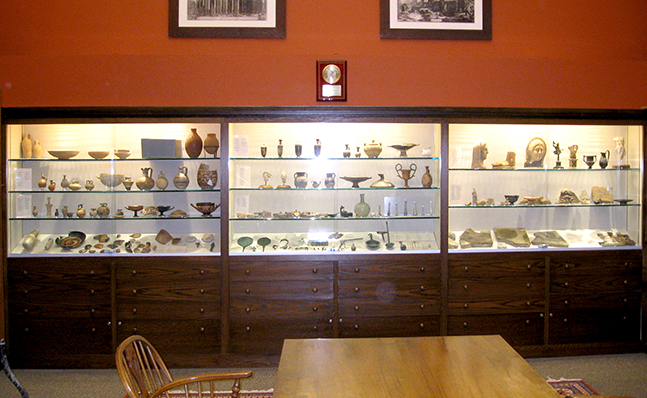
The Van Buren Antiquities Collection
This archeological collection of artifacts from Ancient Greece and Italy was originally the personal study collection of Albert William Van Buren (1878–1968), whose career as professor of archaeology and curator of the Archaeological Study Collection at the American Academy in Rome spanned more than five decades. He introduced generations of American students to the monuments of Rome, Latium and Etruria. The collection was sold to the Smith College Latin department in 1925.
Adviser: Thalia Pandiri
Programs in Greece
College Year in Athens
Smith's approved program for students who want to study classics in Greece.
The American School of Classical Studies at Athens, Summer Session
This site contains a list of fellowships and school programs/sessions; look through it to find a program that will work for you.
Programs in Italy
The American Academy in Rome, Classical Summer School
The description states that high school teachers and graduate students may apply, but advanced undergraduates are also eligible.
The Intercollegiate Center for Classical Studies in Rome (ICCS)
Smith's approved program for students who want to study classics in Italy.
John Everett Brady Prize
The John Everett Brady Prize is open to all classes and is awarded for excellence in the translation of Latin at sight; a second prize is awarded for the best performance in the beginning Latin course.
Julia Harwood Caverno Prize
The Julia Harwood Caverno Prize is awarded for the best performance in the beginning Greek course.
Alice Hubbard Derby Prize
The Alice Hubbard Derby Prize is awarded to a member of the junior or senior class for excellence in the translation of Greek at sight; a second prize is awarded to a member of the junior or senior class for excellence in the study of Greek literature in the year in which the award is made.
George E. Dimock Memorial Prize
The George E. Dimock Memorial Prize is awarded for the best essay on a classical subject submitted by a Smith College undergraduate.
The Rhorer Fund
The Department of Classical Languages and Literatures has limited funds available from the Catherine Campbell Rhorer Fund, to be awarded:
- For travel and enrichment purposes to classics or classical studies majors who have been accepted to study classics abroad during their junior year.
- In support of summer course work taken at another college or university, after approval by the classics department, by classics or classical studies majors sufficiently advanced in the field, or by graduating seniors.
Normally, successful applicants will have a record of A- or better in Greek and/or Latin courses taken at Smith. Financial need will be taken into consideration in determining awards. Application may be made at any point during the academic year. To compete for an award from the Rhorer Fund, a student should submit a letter of application to the chair of the department consisting of (a) one or two paragraphs describing her projected plan of study and/or travel and explaining how it would enhance her education in classics and (b) a budget.
Five College Classics
Gateways
Archives of Texts
Organizations
- American Academy in Rome
- American Classical League
- American Institute of Archaeology
- American School of Classical Studies at Athens
- Classical Association of the Atlantic States
- Classical Association of the Middle West and South
- Classical Association of New England
- Septentrionale Americanum Latinitatis Vivae Institutum
- The Society for Classics Studies
Resources, Bibliography, Databases and Publications
Contact
Email: jroberts@smith.edu
Administrative Assistant: Jennifer Roberts
Individual appointments can be arranged directly with the faculty.

